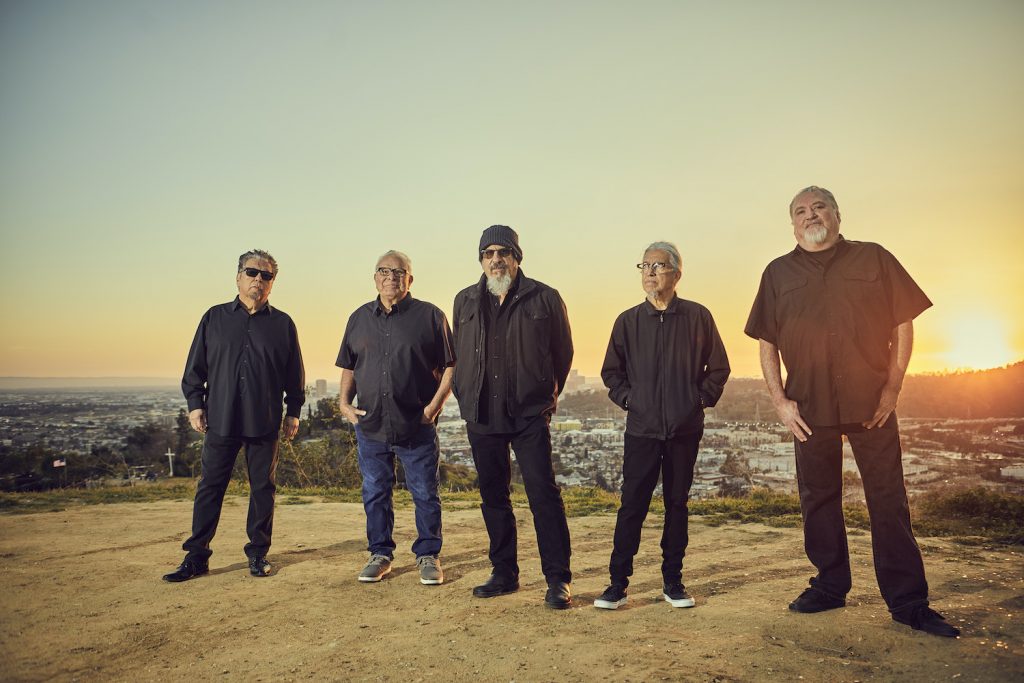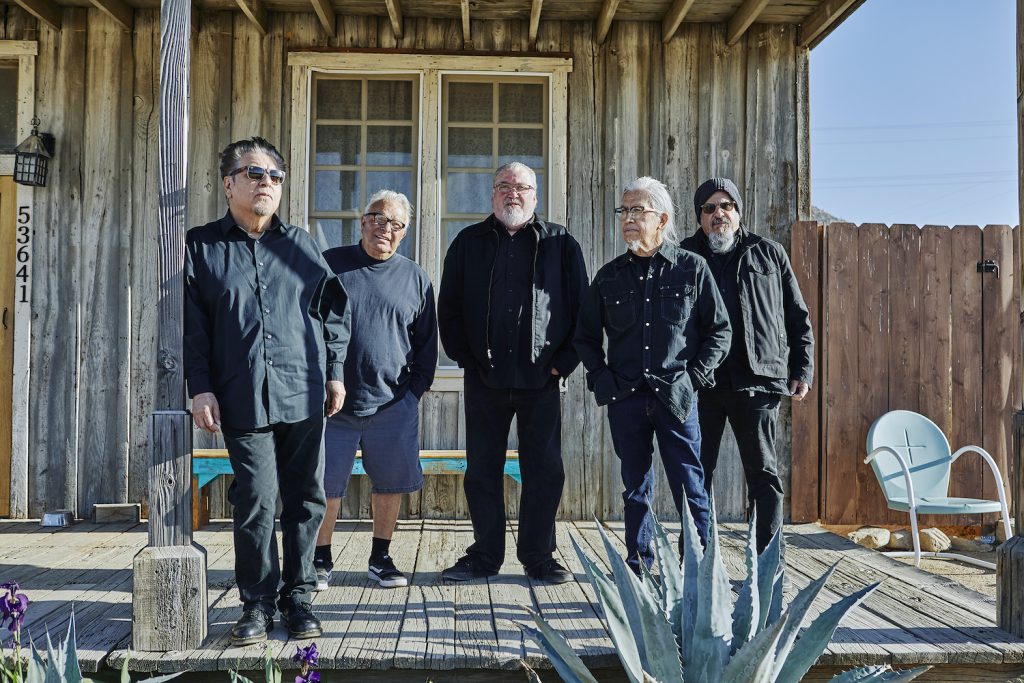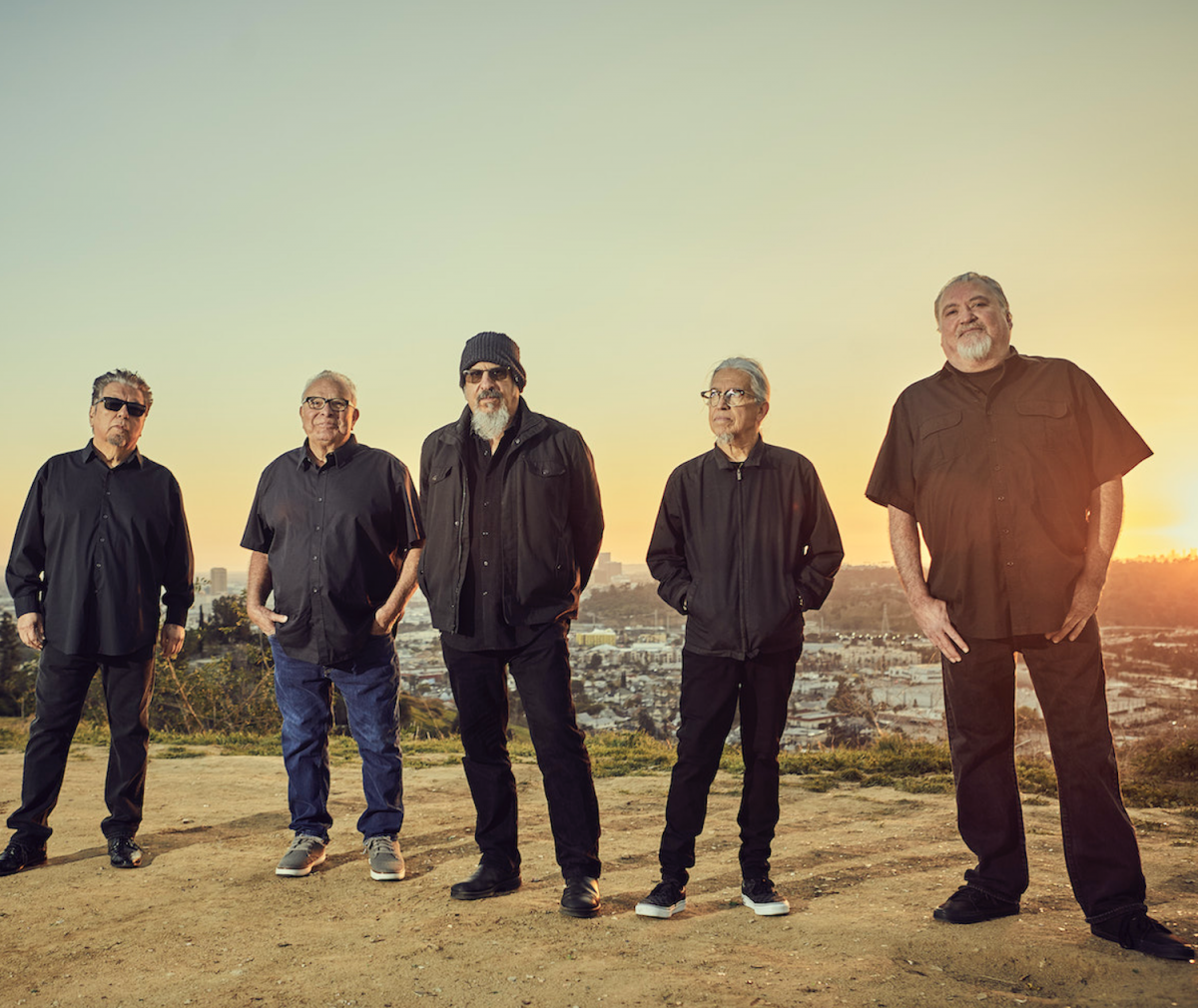
Native Sons (New West) is an atypical covers album from an atypical band. A diverse tribute to Los Lobos’ Angelino roots and its melting pot of sounds, the group’s 17th full-length release is an impressive attempt to bring some geographical and cultural context to one of rock’s most trailblazing and idiosyncratic bands. Kicking off with a frenzied version of Thee Midniters’ “Love Special Delivery,” one of the first major U.S. hits for a Chicano rock act, the album mixes the familiar (Buffalo Springfield’s “Bluebird”/“For What It’s Worth,” Jackson Browne’s “Jamaica Say You Will,” the Beach Boys’ “Sail On, Sailor”) with the more exotic (the East L.A.-centric “Los Cuchos Suaves” and “Dichoso”). The sole original is the lilting, reflective title track. It’s the beating heart to this loving homage to Los Angeles.
The band also takes on “Flat Top Joint” by the Blasters, the early-’80s outfit that cleared the way for Los Lobos’ genre-busting take on roots rock. Philadelphia native Steve Berlin was fortunate enough to be an integral part of both groups, taking leave from the Blasters to coproduce Los Lobos’ 1984 debut, How Will The Wolf Survive?, with T Bone Burnett and quickly becoming a full-time band member. Almost four decades later, Berlin, David Hidalgo, Cesar Rosas, Conrad Lozano and Louie Pérez are paying tribute to their heroes at a time when younger bands can rightly claim Los Lobos—and the Blasters, for the matter—as an influence.
Berlin recently chatted with MAGNET about the making of Native Suns and his unique contributions to Los Angeles’ seminal ’80s scene.
Los Lobos has always had a way with covers. You had a huge hit with “La Bamba,” and I’d argue that your version of the Dead’s “Bertha” improves on the original. What’s so different about your interpretive approach?
We grew up in the radio era, so usually the songs we cover are part of our DNA. So there’s a lot of love and respect. And covers are fun, what can I say? People are rarely displeased when we pull one out—no matter how stupid it is.
How did you go about assembling the songs for Native Sons?
When it started, it was just a covers record. But, to me, that was too expansive. It was going to be way too hard to have any sort of thematic cohesion. So it was my idea to narrow it down a bit to the L.A. theme to give it some parameters and keep the thing online. There wasn’t unanimity, to say the least. A couple of guys in the band thought it was a dumb idea. I was the archivist of the thing. I had a running spreadsheet so I could tell at a glance where we were at any given time. By September of last year, I hadn’t bothered to count how many songs we had. Suddenly, I was like, “Holy shit. We have 14 fuckin’ songs. How the fuck did that happen?” I was amazed. With COVID, there was a lot of stops and starts. We did four songs in the first session and took a break for six months. It would’ve been much harder to do an album of originals with that kind of herky-jerky aspect of life under COVID.
The album covers a lot of ground stylistically. Do you feel like you missed anything?
The one area we didn’t properly highlight was the L.A. punk rock scene circa 1980-’81. We just couldn’t find a song we could pull off without sounding stupid. A lot of those songs are hard to play. Certainly “Jamaica Say You will” wasn’t easy, either. But those punk rock songs are serious. We were all really good pals with everybody from that scene—the Minutemen, Black Flag, Circle Jerks. Even if you can’t point to it in our music like you can with Jackson Browne or something else on this record, it was a huge part of our development. I lot of that stuff we still carry to this day—the work ethic and the whole “bringing somebody up with you” kind of thing. That’s all real for us. Louie and I talked about it a lot … How do we not find something—anything—that pointed to how important that moment was to us as people and a band? That’s my only regret.

Was the title track an inspiration for—or a product of—this project?
There’s a pattern we’ve repeated with every album going back to (2002’s) Good Morning Atzlán. We start a record, and somewhere toward the last two-thirds of it, a song emerges that puts the whole thing into perspective. On Good Morning Atzlán, it was the title track. We were done with the record, but we didn’t have a title or an organized concept. Then, late on a Friday afternoon, Louie or Dave said, “I have an idea for another song.” Within three hours of that phone call, we’d recorded it. For Native Sons, I think it was Louie who said, “I have an idea for an original. Do you think it would work?” And I’m like, “Of course. It’s about time.” Whatever that artistic mojo is, it is what it is. We certainly didn’t set out to write an original, given that the nature of the album was all covers.
Of all the songs on the album, War’s “The World Is A Ghetto” has the most urgent, epic feel.
There’s two sides to the War family. There’s the Lonnie (Jordan) side, and there’s everyone else. We’re actually close to both sides. They don’t get along, but we get along with all of them. We’re kind of like Switzerland—we don’t have a stake in the fight, which is kind of a weird place to be. We were doing that song while the election was going on—the dark, “not knowing what was going to fuckin’ happen” days of September and October. So that atmosphere certainly fit into the thinking and the making of that song.
As a member of both the Blasters and Los Lobos, what was it like for you to revisit “Flat Top Joint”?
Doing that song was a deep “thank you” to them. The debt we owe to the Blasters could never be repaid—and not just because I was in the band. You and I wouldn’t be talking right now if it weren’t for them. They were our champions. Los Lobos got to play a zillion shows with the Blasters, and it really put us on the map.
What are some of you most pronounced memories of that early-’80s scene in L.A.?
It was like being in a fuckin’ paradise. There was great music happening literally every night of the week all over town. In addition to all this music being out there all at once, everybody was experimenting with their identities. John Doe and I have been buddies forever, I just coproduced his new record, and I didn’t even know his last name (Duchac) until about a year ago. You literally got to decide who you wanted to be.
—Hobart Rowland







